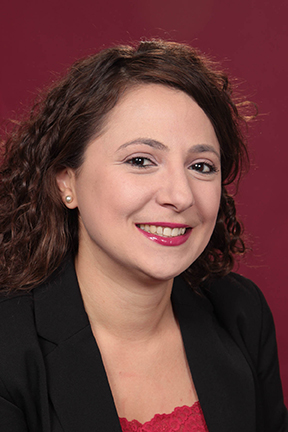Recent News
UNM Engineering Ph.D. candidate named ASCE ‘24 Outstanding Reviewer
August 11, 2025
UNM joins Brown University in national institute focused on intuitive, trustworthy AI assistants
August 6, 2025
UNM Engineering team wins ASEE best paper for work on first-year engineering course
July 17, 2025
New director will enhance interdisciplinary engineering learning opportunities
July 2, 2025
News Archives
Tsiropoulou leading Department of Energy project that breaks ground in renewable energy, wireless communications
August 16, 2023 - by Kim Delker

A University of New Mexico professor is leading a Department of Energy (DOE) project that will make significant strides toward revolutionizing the realms of renewable energy and wireless communications.
Eirini Eleni Tsiropoulou, an associate professor in the Department of Electrical and Computer Engineering, is the principal investigator of “HELIOCOMM: A Resilient Wireless Heliostats Communication System,” which is aimed at merging cutting-edge next-generation (NextG) network technologies with solar thermal power systems that promises to usher in a new era of resilient wireless communications and sustainable energy. The $450,000 project is one of seven awarded by the National Renewable Energy Laboratory and Sandia National Laboratories aimed at achieving DOE’s goals for heliostat cost reduction, sustained multifaceted innovation and improved solar field performance.
UNM’s HELIOCOMM project is poised to redefine the landscape of wireless communications by leveraging the power of NextG network technologies, Tsiropoulou said. She said the objective of the project is to design an exceptionally resilient wireless communications system that seamlessly integrates with heliostat-based concentrating solar thermal power (CSP) systems.
“The project's overarching vision is to create a robust wireless network that enhances the efficiency and performance of CSP systems,” she said. “The core focus of the HELIOCOMM project revolves around the integrated access and backhaul (IAB) technology.”
Tsiropoulou's team will introduce novel mechanisms that tackle critical challenges such as entropy-based routing, dynamic spectrum management and interference mitigation. This project will pave the way for a cohesive, operational wireless communications system that supports the intricate operations within CSP systems.
“The HELIOCOMM project demonstrates the potential for renewable energy and wireless communications to synergize in an unprecedented manner,” she said.
Tsiropoulou said that through her team’s vision and expertise, they are striving to catalyze a paradigm shift that transcends traditional boundaries, paving the way for a future that is both energy-efficient and technologically advanced.
Tsiropoulou, who also leads the PROTON (Performance and Resource Optimization in Networks) Lab in the Department of Electrical and Computer Engineering, is eager to work with two of her graduate students on this project.
“It's truly inspiring to see the PROTON Lab's commitment to innovation and excellence by involving two talented Ph.D. students, Md Sadman Siraj and Aisha B. Rahman, in the execution of this groundbreaking project,” she said. “Their dedication and expertise are sure to contribute significantly to the success and impact of the HELIOCOMM project.”
The National Renewable Energy Laboratory and Sandia National Laboratories are co-leads of the Heliostat Consortium, also known as HelioCon, which was established in 2021 to integrate all types of stakeholder input to address the challenges in heliostat technology advancement and market adoption. The projects will focus on lowering the cost of heliostats and heliostat technologies and creating new market opportunities for the heliostat industry over the next few years.
